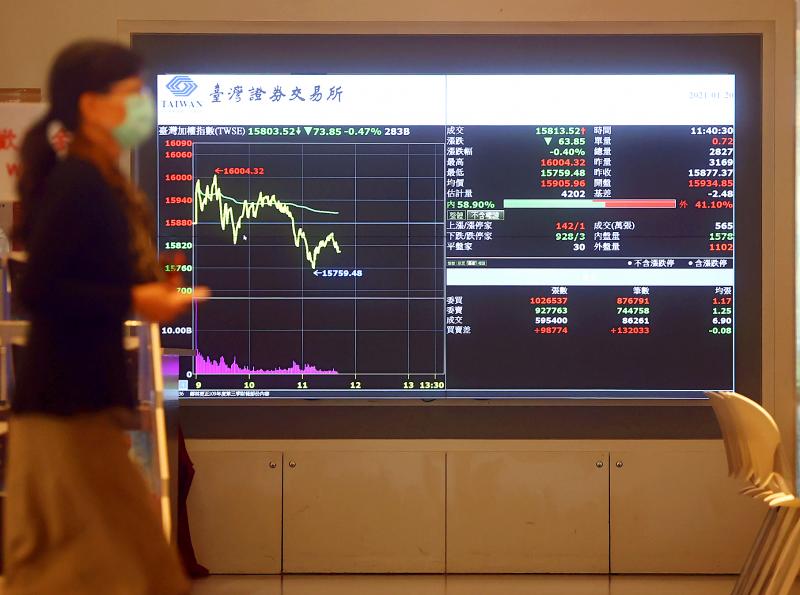Following the TAIEX’s dramatic rise over the past year, investors have turned cautious about the market’s direction going forward, a survey released by Cathay Financial Holding Co (國泰金控) yesterday showed.
Only 10.2 percent of those polled expected the weighted index to hit a peak of 15,500 to 16,000 points and 7.1 percent expected it to end above 16,000 points, the survey showed.
A larger number, 40 percent, expected the TAIEX to peak above 15,000 points by the end of the first half, while 37.1 percent expected it to peak between 14,500 and 15,000 points, it showed.

Photo: CNA
The index fell 0.45 percent yesterday to close at 15,806.18.
The report surveyed 20,912 of Cathay Financial’s clients between Jan. 1 and Jan. 7, when the TAIEX climbed from 14,732 points to 15,214 points.
As a majority of Cathay’s clients are retail investors, their predictions likely reflect public confidence in the market rather than a research-based forecast about the market, a Cathay Financial official surnamed Wu (吳) told the Taipei Times by telephone.
“Given that when we conducted a similar poll in January last year, with the TAIEX at about 12,000 points at the time, only 27 percent of respondents forecast that the TAIEX would continue climbing and peak above 12,500 points, it seems that Taiwanese are more upbeat about the stock market this year,” Wu said.
Their optimism corresponds with a rise in their risk preference, with 33.3 percent of respondents willing to withdraw their fixed deposits and invest them in the stock market, up from 30.6 percent a month earlier and 25.6 percent a year earlier, Wu said.
Overall, 46.3 percent of respondents expected the TAIEX to continue rising in the next six months, followed by 16.7 percent who believed it would be flat and 23.4 percent predicting that it would decline, the survey showed.
Meanwhile, public confidence in the economy picked up, with 43.8 percent forecasting that the economy would improve in the next six months, up from 42.5 percent a month earlier, which could be attributed to the rising availability of COVID-19 vaccines, Cathay said.
However, respondents’ willingness to buy durable goods, such as vehicles or home appliances, and to make big-ticket purchases, such as travel or shopping, diverged, with the former growing from 20.7 percent a month earlier to 22.6 percent, while the latter declined from 29.5 percent to 28.5 percent, the survey showed.
Wu said it was quite curious, “as people were usually more willing to make big-ticket purchases rather than spending on durable goods during past economic recoveries.”
This might be due to rising demand for electronic goods because of the work-from-home trend or falling demand for travel because of strict border controls, Wu said.

With an approval rating of just two percent, Peruvian President Dina Boluarte might be the world’s most unpopular leader, according to pollsters. Protests greeted her rise to power 29 months ago, and have marked her entire term — joined by assorted scandals, investigations, controversies and a surge in gang violence. The 63-year-old is the target of a dozen probes, including for her alleged failure to declare gifts of luxury jewels and watches, a scandal inevitably dubbed “Rolexgate.” She is also under the microscope for a two-week undeclared absence for nose surgery — which she insists was medical, not cosmetic — and is

CAUTIOUS RECOVERY: While the manufacturing sector returned to growth amid the US-China trade truce, firms remain wary as uncertainty clouds the outlook, the CIER said The local manufacturing sector returned to expansion last month, as the official purchasing managers’ index (PMI) rose 2.1 points to 51.0, driven by a temporary easing in US-China trade tensions, the Chung-Hua Institution for Economic Research (CIER, 中華經濟研究院) said yesterday. The PMI gauges the health of the manufacturing industry, with readings above 50 indicating expansion and those below 50 signaling contraction. “Firms are not as pessimistic as they were in April, but they remain far from optimistic,” CIER president Lien Hsien-ming (連賢明) said at a news conference. The full impact of US tariff decisions is unlikely to become clear until later this month

GROWING CONCERN: Some senior Trump administration officials opposed the UAE expansion over fears that another TSMC project could jeopardize its US investment Taiwan Semiconductor Manufacturing Co (TSMC, 台積電) is evaluating building an advanced production facility in the United Arab Emirates (UAE) and has discussed the possibility with officials in US President Donald Trump’s administration, people familiar with the matter said, in a potentially major bet on the Middle East that would only come to fruition with Washington’s approval. The company has had multiple meetings in the past few months with US Special Envoy to the Middle East Steve Witkoff and officials from MGX, an influential investment vehicle overseen by the UAE president’s brother, the people said. The conversations are a continuation of talks that

CHIP DUTIES: TSMC said it voiced its concerns to Washington about tariffs, telling the US commerce department that it wants ‘fair treatment’ to protect its competitiveness Taiwan Semiconductor Manufacturing Co (TSMC, 台積電) yesterday reiterated robust business prospects for this year as strong artificial intelligence (AI) chip demand from Nvidia Corp and other customers would absorb the impacts of US tariffs. “The impact of tariffs would be indirect, as the custom tax is the importers’ responsibility, not the exporters,” TSMC chairman and chief executive officer C.C. Wei (魏哲家) said at the chipmaker’s annual shareholders’ meeting in Hsinchu City. TSMC’s business could be affected if people become reluctant to buy electronics due to inflated prices, Wei said. In addition, the chipmaker has voiced its concern to the US Department of Commerce